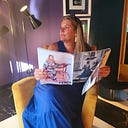Member-only story
Holy Water
Last night, we used the very last drops of the holy water we collected from the Virgin Mary’s house in Turkey, said to have healing, fertility, and miraculous powers.
Last night, we used the very last drops of the holy water we collected from the Virgin Mary’s house in Turkey, said to have healing, fertility, and miraculous powers.
It lasted 12 years, through cancer, infertility, car accidents, five continents, two hemispheres, one dog, one marriage, and three children: healing, love, good fortune, good health, abundance, protection, safe passage, courage, resilience, and grace. Blessings upon blessings upon blessings.
Now what? What will we do without it? It’s currently impossible to travel to Turkey to refill it, and substitutes aren’t easy to find. Isn’t it interesting how we become attached to our things? How some things become irreplaceable?
During #quarantinelife, our family has been confronting our dependence on stuff. According to The Psychology of Stuff and Things, our possessions become extensions of ourselves. We use our stuff to signal to ourselves, and others, who we want to be and where we want to belong. And long after we’re gone, they become our legacy. Some might even say our essence lives on in what once we made or owned.
As our lives unfold, our things embody our sense of self and identity even further, becoming external repositories for our memories, relationships, and travels.
As our belongings accumulate, becoming more infused with our identities, their preciousness increases. That’s what happened with our holy water, the more times we used it, the more precious it became.
Isn’t that just the perfect metaphor for life? We want to save our most precious stuff, to protect it, preserve it, or make it last, but the value only increases if we use it.
